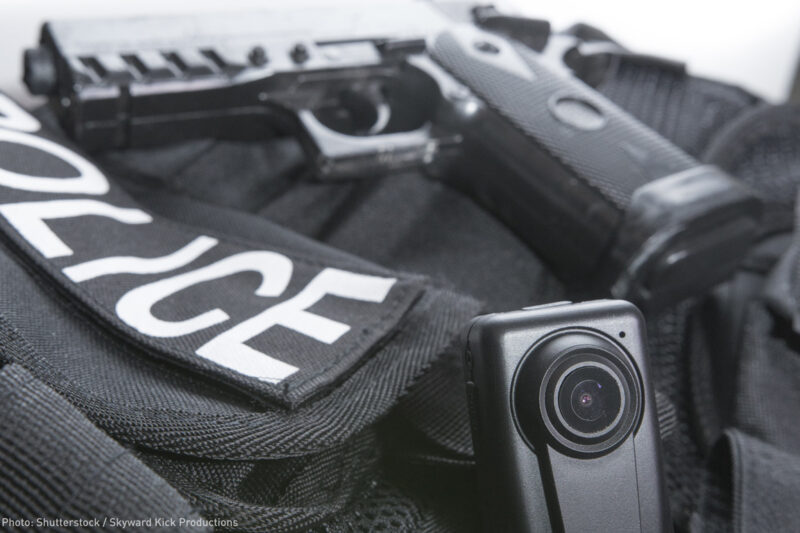
This article originally appeared in .
Earlier this month, a too familiar tragedy unfolded in East Los Angeles . Witness accounts vary ŌĆö the police department says Romero fled when officers approached him on suspicion of scrawling graffiti in his neighborhood, then fired at officers. Some civilians say he had a gun but tossed it away.
As is increasingly common, the incident was captured on officersŌĆÖ body cameras.
Los Angeles officials have touted body cameras as a way to provide transparency and and between police and the public in moments of crisis. But thatŌĆÖs not how it has played out because the LAPDŌĆÖs policies for body cameras donŌĆÖt provide transparency or assure the public that officers will be held accountable.
Instead, the department has stated that it generally unless ordered by a court to release them. RomeroŌĆÖs family has called for the footage to be released.
According to LAPD policy, before talking to investigators. Instead of promoting transparency and trust, LAPDŌĆÖs body camera program has resulted in more questions than answers.
When body cameras were proposed nationwide, there seemed to be wide agreement they could be a game-changer for police interactions, oversight, and community relations. Public support has been through the roof. And body cameras have provided important evidence in at least some of the rare decisions to fire or criminally charge officers for or . But as departments put cameras on the streets, the evidence of their effectiveness has been much more mixed. found that officers wearing cameras are much less likely to use force or to be subject to complaints from civilians.
But other studies are , with at least one showing an increase in the use of force and another that when officers have more discretion over when to activate cameras. Against this ambiguous backdrop, police reform advocates have raised concerns about the camerasŌĆÖ privacy implications, surveillance potential, and susceptibility to misuse.
Despite these questions, departments nationwide are moving to adopt body cameras. It is vital that those departments have strong policies that ensure cameras are used for accountability, not surveillance.
Departments must clearly require officers to record every investigative interaction with a member of the public. While constant recording could risk civiliansŌĆÖ and officersŌĆÖ privacy, departments can ŌĆö and must ŌĆö monitor compliance and discipline those who fail to record when they should. Officers who repeatedly fail to record incidents should be identified and corrected ŌĆö or fired ŌĆö long before theyŌĆÖre involved in a serious incident.
When thereŌĆÖs a shooting or other investigation, policies must require officers to give initial accounts of what happened and why they acted as they did before watching the body camera video. Seeing the video allows cops who are inclined to lie to tailor their story to the evidence. Even for officers who try to tell the truth, seeing the video will impact how they remember an incident. What helps investigators piece together the whole truth is the officersŌĆÖ subjective memory of what they thought at the time. The police donŌĆÖt let other witnesses watch the video of a shooting before providing a statement or show other suspects the evidence in a case before interviewing them. Police shouldnŌĆÖt have such an advantage.
Video of shootings and other potential misconduct must be released, pursuant to policies that ensure they donŌĆÖt just get out when it helps the officers. Transparency allows the public to judge for themselves whether police are acting in keeping with a communityŌĆÖs values, and whether the institutions charged with holding officers accountable are working.
Finally, departments should clearly prohibit use of body cameras as surveillance tools. Video shouldnŌĆÖt be accessed unless thereŌĆÖs reason to think it contains evidence of crime or misconduct, and data-mining tools, such as facial recognition, mustnŌĆÖt be used on the video. Moreover, strict limits should be placed on how long footage is retained. The public supports body cameras as tools for police accountability. Mission creep into surveillance should be stopped at the outset.
The policies that govern the use of body cameras matter. Sadly, a recent shows many departmentsŌĆÖ policies are seriously flawed, if they have any public policy on the cameras at all. This can and must be fixed.
Body cameras will never be a cure-all for police misconduct or the crisis of confidence in law enforcement that many of us feel. But if they are to be any help at all ŌĆö and they could be ŌĆö they must be done right.

